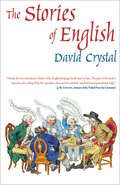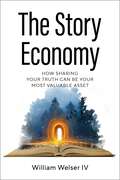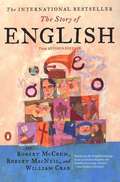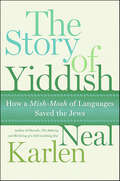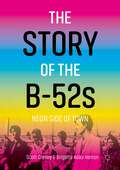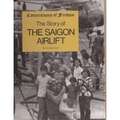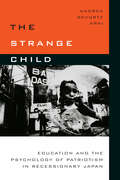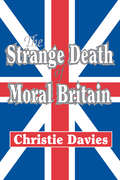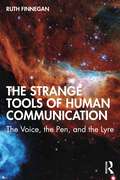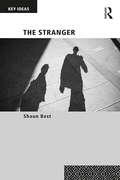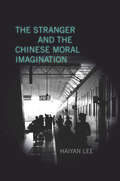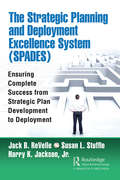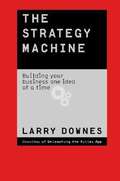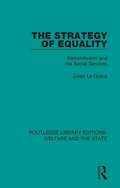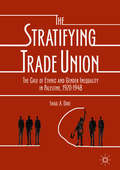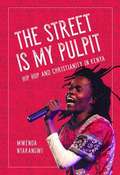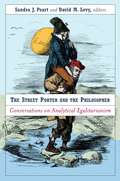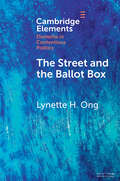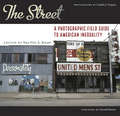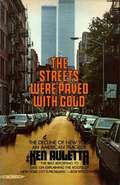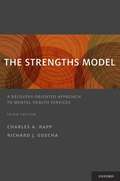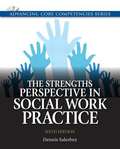- Table View
- List View
The Stories of English: The Persnickety Story Of English Punctuation
by David CrystalA groundbreaking history of worldwide English in all its dialects, differences, and linguistic delights: “Informative . . . distinctive . . . a spirited celebration.” —The GuardianIn this “well-informed and appealing” work (Publishers Weekly), David Crystal puts aside the usual focus on “standard” English, and instead provides a startlingly original view of where the richness, creativity, and diversity of the language truly lies—in the accents and dialects of nonstandard English users all over the world. Whatever their regional, social, or ethnic background, each group has a story worth telling, whether it is in Scotland or Somerset, South Africa or Singapore. He reminds us that for several hundred wonderful years, there was no such thing as “incorrect” English—and traces the evolution of the language from a few thousand Anglo-Saxons to the 1.5 billion people who speak it today.Moving from Beowulf to Chaucer to Shakespeare to Dickens and the present day, Crystal puts regional speech and writing at center stage, giving a sense of the social realities behind the development of English. This significant shift in perspective enables us to understand for the first time the importance of everyday, previously marginalized, voices in our language—and provides an argument too for the way English should be taught in the future.“A work of impeccable scholarship [that] could easily serve as a standard textbook for students of linguistics, but Mr. Crystal, reaching out to a more general audience, recognizes that even the most avid reader might flinch at the sections on Old Norse grammatical influence. Cleverly, he has sprinkled the book with little digressions, set apart in boxes, that address historical mysteries, strange loanwords, interesting etymologies and the like.” —The New York Times“Learned and often provocative . . . demonstrates repeatedly that common conceptions about language are often historically inaccurate—split infinitives bothered no one until recently (likewise sentence-ending prepositions).” —Kirkus Reviews (starred review) “Simply the best introductory history of the English language family that we have. The plan of the book is ingenious, the writing lively, the exposition clear, and the scholarly standard uncompromisingly high.” —J.M. Coetzee, winner of the Nobel Prize in Literature
The Story Economy: How Sharing Your Truth Can Be Your Most Valuable Asset
by William WelserRegain Control Over Your Data, Devices, and Freedom How do you value your private data? What about your job? The truth is someone is selling your data, and your job may be among the countless others being lost to AI at record rates. Because of this abuse of technology among many others, most people have lost all agency over their technology, devices, and information. But technologist William Welser IV has a plan to help us regain control. Enter The Story Economy, a guide that provides fresh purchasing power in a world where opportunity feels harder and harder to grasp. Within, Welser outlines the need for an alternative economy where stories can become solutions to overwhelming new problems. His entirely new marketplace allows us to use our stories as currency, putting the data we&’ve voluntarily given to good use—allowing us to purchase goods and services and giving us the power to see exactly where our data is going and to whom. In this exciting and sometimes scary world of AI, Big Tech is using all of its tools against us to create a society in which we&’re lonely, broke, and lost. We must take back our power and make the technology work for us to close the healthcare, education, and wealth divide—and in the process, foster self-awareness to help us become astute decision-makers and stay ahead of technology. With The Story Economy, Welser provides the innovative blueprint to get started.
The Story Of English, Third Revised Edition
by Robert Macneil Robert Mccrum William CranNow revised, The Story of English is the first book to tell the whole story of the English language. Originally paired with a major PBS miniseries, this book presents a stimulating and comprehensive record of spoken and written English—from its Anglo-Saxon origins some two thousand years ago to the present day, when English is the dominant language of commerce and culture with more than one billion English speakers around the world. From Cockney, Scouse, and Scots to Gulla, Singlish, Franglais, and the latest African American slang, this sweeping history of the English language is the essential introduction for anyone who wants to know more about our common tongue.
The Story of Yiddish: How a Mish-Mosh of Languages Saved the Jews
by Neal KarlenYiddish—an oft-considered "gutter" language—is an unlikely survivor of the ages, much like the Jews themselves. Its survival has been an incredible journey, especially considering how often Jews have tried to kill it themselves. Underlying Neal Karlen's unique, brashly entertaining, yet thoroughly researched telling of the language's story is the notion that Yiddish is a mirror of Jewish history, thought, and practice—for better and worse. Karlen charts the beginning of Yiddish as a minor dialect in medieval Europe that helped peasant Jews live safely apart from the marauders of the First Crusades. Incorporating a large measure of antique German dialects, Yiddish also included little scraps of French, Italian, ancient Hebrew, Aramaic, the Slavic and Romance languages, and a dozen other tongues native to the places where Jews were briefly given shelter. One may speak a dozen languages, all of them Yiddish.By 1939, Yiddish flourished as the lingua franca of 13 million Jews. After the Holocaust, whatever remained of Yiddish, its worldview and vibrant culture, was almost stamped out—by Jews themselves. Yiddish was an old-world embarrassment for Americans anxious to assimilate. In Israel, young, proud Zionists suppressed Yiddish as the symbol of the weak and frightened ghetto-bound Jew—and invented modern Hebrew. Today, a new generation has zealously sought to explore the language and to embrace its soul. This renaissance has spread to millions of non-Jews who now know the subtle difference between a shlemiel and a shlimazel; hundreds of Yiddish words dot the most recent editions of the Oxford English Dictionary.The Story of Yiddish is a delightful tale of a people, their place in the world, and the fascinating language that held them together.
The Story of the B-52s: Neon Side of Town
by Scott Creney Brigette Adair HerronThe Story of the B-52s: Neon Side of Town is the first critical history of one of the most legendary and influential bands in American popular music. Locating The B-52s in the intellectual climate of their hometown of Athens, GA and following the band from New York’s downtown scene in the early 1980s to their upcoming farewell tour, the book argues that The B-52s are much more significant political and musical influences on American society than their reputation as a silly party band suggests, and that their ongoing commitment to values including cooperation, mutual support, and using disruptive fun as a form of social change are an antidote to the neoliberalization sweeping both Athens and the rest of the Western world. For example, the book shows how the band synthesized influences from the modern artists displayed at the University of Georgia art museum, early queer activism on campus in the 1970s, and their experiences as queer people living through the AIDS crisis to create music that continues to be artistically and politically influential today. The authors are active members of the Athens, GA music scene, and the book includes original interviews with a range of number close to the band.
The Story of the Irish People
by Sean O'FaolainSean O'Faolain, a distinguished Irish novelist and short story writer, has written a terse, luminous inquiry into Ireland and the Irishman. "This book," writes O'Faolain, "is not a history of political events, although some political events are described briefly in the course of the main narrative. It is, in effect, a creative history of the growth of the racial mind; or, if the term were not too large and grandiose, the story of the development of a national civilization..." This modest description of the author's purpose does not indicate that The Story of the Irish People is unusually good history and unusually good reading. The Story of the Irish People presents and explains the historic influences that have molded the character of the Irish down through the centuries. In agreement with Arnold Toynbee's view of history as a series of challenges and responses, and with R. G. Collingwood's statement, "History proper is the history of thought; there are no mere events in history," O'Faolain ranges the fields of political and religious history, economic and artistic development, mythology, literature, and social structure. He does much to clarify the contradictions of Irish character and history that have so long puzzled historians and biographers. O'Faolain contends that contemporary Irish traits and values are largely the results of a series of invasions dating from prehistory. He shows that each of these invasions in turn made its distinct contributions. The Celts brought their mythology, the Romans Christianity, the Danes built the towns, the Normans erected the abbeys and the castles, and the English brought their language and their law. Irish characteristics are epitomized in Ireland's rebels, writers, and clergy, all of whom receive a penetrating analysis. As a preliminary to the study of Irish literature, to research in Irish history, or simply as an introduction to the people "whose wars are always merry and whose songs are always sad," this book, by one of Ireland's leading writers, is helpful, informative, and highly interesting.
The Story of the Saigon Airlift (Cornerstones of Freedom)
by Zachary KentDescribes that dramatic helicopter airlift, the largest in history, which during two days in 1975 carried thousands of Americans and selected South Vietnamese out of Saigon as the North Vietnamese marched to capture the city, thus ending the long Vietnam War.
The Strange Child: Education and the Psychology of Patriotism in Recessionary Japan
by Andrea Gevurtz AraiThe Strange Child examines how the Japanese financial crisis of the 1990s gave rise to "the child problem," a powerful discourse of social anxiety that refocused concerns about precarious economic futures and shifting ideologies of national identity onto the young. Andrea Arai's ethnography details the different forms of social and cultural dislocation that erupted in Japan starting in the late 1990s. Arai reveals the effects of shifting educational practices; increased privatization of social services; recessionary vocabulary of self-development and independence; and the neoliberalization of patriotism. Arai argues that the child problem and the social unease out of which it emerged provided a rationale for reimagining governance in education, liberalizing the job market, and a new role for psychology in the overturning of national-cultural ideologies. The Strange Child uncovers the state of nationalism in contemporary Japan, the politics of distraction around the child, and the altered life conditions of--and alternatives created by--the recessionary generation.
The Strange Death of Moral Britain
by Christie DaviesIn the last half of the twentieth century, a once respectable and religious Britain became a seriously violent and dishonest society, one in which person and property were at risk, family breakdown ubiquitous, and drug and alcohol abuse rising. "The Strange Death of Moral Britain" demonstrates in detail the roots of Britain's decline. It also shows how a society, strongly Protestant in both morality and identity, became one of the most secular societies in the world. The culture wars about abortion, capital punishment, and homosexuality that have convulsed the United States have little meaning in Britain, where there is neither a moral majority nor an indigenous emphasis on rights. In the period when Britain had a strong national and religious identity, defense of this identity led to legal persecution of male homosexuals. As Britain's identity crumbled, homosexuality ceased to be an important issue for most people. Similarly, all the pressing questions on abortion, capital punishment, and homosexuality were settled permanently on a purely utilitarian basis in Britain, where all sources of moral argument are weak. The ending of the death penalty marked the decline of the influence of the official hierarchies of church and state, the Church of England, the armed forces, and their representative, the Conservative Party. "The Strange Death of Moral Britain" is a study of moral change, secularization, loss of identity, and the growth of deviant behavior in Britain in the twentieth century. Based on detailed scholarship, it is a tightly argued and clearly written volume that will be of interest to scholars of religious studies and British social history.
The Strange Tools of Human Communication: The Voice, the Pen, and the Lyre
by Ruth FinneganThe Strange Tools of Human Communication: The Voice, the Pen, and the Lyre is a thought-provoking exploration of the everyday tools of communication that weaves together history, art, and science to reveal how the voice, hand, and mind shape our shared experiences.Through a blend of scholarly research, personal insights, and field experiences – from the oral tales of Sierra Leone's Limba storytellers to ancient cave art and modern iconography – this book offers fresh perspectives on how we connect across time and cultures. Challenging the idea that spoken language alone defines humanity, it emphasises the crucial role of hands, gestures, and artistic forms as the foundation of human communication. Readers are invited to consider the possibility of an ancestral, shared consciousness and the mysterious similarities in ancient art worldwide. Through vivid examples and personal insights, the book redefines communication as a blend of conscious expression and subconscious influence, inviting readers to consider the hidden connections that unite us across cultures and time, and to contemplate the future of communication.The Strange Tools of Human Communication is an ideal supplement to upper level undergraduate and graduate courses in cultural anthropology, sociocultural linguistics, and cultural studies.
The Stranger (Key Ideas)
by Shaun BestThis book explores the concept of the stranger as a ‘modern’ social form, identifying the differing conceptions of strangerhood presented in the literature since the publication of Georg Simmel’s influential essay ‘The Stranger’, questioning the assumptions around what it means to be regarded as ‘strange’, and identifying the consequences of being labelled a stranger. Organised both chronologically and thematically, the book begins with Simmel’s major essays on the stranger and culminates with an analysis of Zygmunt Bauman’s thought on the subject, with each chapter introducing an idea or key theme initially discussed by Simmel before exploring the development of the theme in the work of others, including Schütz, Derrida, and Levinas. The stranger is an enduring concept across many disciplines and is central to contemporary debates about refugees, asylum, the nature of inclusion and exclusion, and the struggle for recognition. As such, this book will be of interest to scholars across the social sciences.
The Stranger and the Chinese Moral Imagination
by Haiyan LeeIn the last two decades, China has become a dramatically more urban society and hundreds of millions of people have changed residence in the process. Family and communal bonds have been broken in a country once known as "a society of kith and kin. " There has been a pervasive sense of moral crisis in contemporary China, and the new market economy doesn't seem to offer any solutions. This book investigates how the Chinese have coped with the condition of modernity in which strangers are routinely thrust together. Haiyan Lee dismisses the easy answers claiming that this "moral crisis" is merely smoke and mirrors conjured up by paternalistic, overwrought leaders and scholars, or that it can be simply chalked up to the topsy-turvy of a market economy on steroids. Rather, Lee argues that the perception of crisis is itself symptomatic of a deeper problem that has roots in both the Confucian tradition of kinship and the modern state management of stranger sociality. This ambitious work is the first to investigate the figure of the stranger-foreigner, peasant migrant, bourgeois intellectual, class enemy, unattached woman, animal-across literature, film, television, and museum culture. Lee's aim is to show that hope lies with a robust civil society in which literature and the arts play a key role in sharpening the moral faculties and apprenticing readers in the art of living with strangers. In so doing, she makes a historical, comparative, and theoretically informed contribution to the on-going conversation on China's "(un)civil society. "
The Strategic Planning and Deployment Excellence System (SPADES): Ensuring Complete Success from Strategic Plan Development to Deployment
by Jack B. ReVelle Susan L. Stuffle Harry K. JacksonThe Strategic Planning and Deployment Excellence System (SPADES) provides a path to long-term success in the environment of rapidly changing technology and business systems. It combines the best of Hoshin Kanri, Quality Function Deployment (QFD), and other proven management and leadership tools and techniques. This book presents a set of tools and techniques for developing and deploying a long-term plan for achieving sustained success. These concepts ensure graphically tracing the strategic planning process from the foundation of organizational principles to the enterprise vision and to the organization’s long-term goals. The Scientific Method is the foundation upon which the tools and techniques of SPADES are applied. The Scientific Method begins with an observation of a phenomenon which leads to development of a hypothesis to explain the phenomenon. The hypothesis is then tested and, based on the analysis of the results, then accepted or adjusted as necessary. The testing may then be repeated to verify conclusions. The Deming-Shewhart Cycle of plan-do-check-act (PDCA) is the application of the Scientific Method for control and continual improvement of processes and products. SPADES is the integrated evolution of the PDCA Cycle and QFD to answer the challenges of how to stay competitive, year after year, in a dynamic environment of rapidly changing customer requirements and technology.
The Strategy Machine: Building Your Business One Idea at a Time
by Larry DownesThe Strategy Machine shows managers how to reinvent business and integrate new technology for a revolution in progress. Regardless of the kind of business or the size of your company, whether you work in operations, sales, or finance, or whether you are the CEO or a manager in training, the tools in this book will teach you how to innovate on a daily basis and how to profit from the transformation going on right now in your industry. This is a guidebook for the information revolution - one that will help companies succeed in the long run, with a winning portfolio, in today's economy.
The Strategy of Equality: Redistribution and the Social Services (Routledge Library Editions: Welfare and the State #13)
by Julian Le GrandOriginally published in 1982 The Strategy of Equality examines public expenditure on the social services as a strategy for promoting social equality. Today there is a widespread belief that the strategy has worked and that public spending on the social services primarily benefits those less well off. However, there have been few attempts to examine whether this belief is founded in reality. This book attempts to rectify this. Examining four areas of social policy: health care, education, housing, and transport, the book looks at the distribution of public expenditure and the ‘outcome’ of that expenditure, as well as the implications for various conceptions of equality.
The Stratifying Trade Union
by Shaul A. DukeThis book examines a basic assumption behind most of the critical, progressive thinking of our times: that trade unions are necessarily tools for solidarity and are integral to a more equal and just society. Shaul A. Duke assesses the trade union's potential to promote equality in ethnically and racially diverse societies by offering an in-depth look into how unions operate; how power flows between union levels; where inequality originates; and the role of union members in union dynamics. By analyzing the trade union's effects on working-class inequality in Palestine during 1920-1948, this book shifts the conventional emphasis on worker-employer relations to that of worker-worker relations. It offers a conceptualization of how strong union members directed union policy from below in order to eliminate competition, often by excluding marginalized groups. The comparison of the union experiences of Palestinian-Arabs, Jewish-Yemeni immigrants, and Jewish women offers a fresh look into the labor history of Palestine and its social stratification.
The Street Is My Pulpit: Hip Hop and Christianity in Kenya
by Mwenda NtarangwiTo some, Christianity and hip hop seem antithetical. Not so in Kenya. There, the music of Julius Owino, aka Juliani, blends faith and beats into a potent hip hop gospel aimed at a youth culture hungry for answers spiritual, material, and otherwise. Mwenda Ntarangwi explores the Kenyan hip hop scene through the lens of Juliani's life and career. A born-again Christian, Juliani produces work highlighting the tensions between hip hop's forceful self-expression and a pious approach to public life, even while contesting the basic presumptions of both. In The Street Is My Pulpit , Ntarangwi forges an uncommon collaboration with his subject that offers insights into Juliani's art and goals even as Ntarangwi explores his own religious experience and subjective identity as an ethnographer. What emerges is an original contribution to the scholarship on hip hop's global impact and a passionate study of the music's role in shaping new ways of being Christian in Africa.
The Street Porter and the Philosopher: Conversations on Analytical Egalitarianism
by Sandra J. Peart David M. LevyAdam Smith, asserting the common humanity of the street porter and the philosopher, articulated the classical economists' model of social interactions as exchanges among equals. This model had largely fallen out of favor until, recently, a number of scholars in the avant-garde of economic thought rediscovered it and rechristened it "analytical egalitarianism." In this volume, Sandra J. Peart and David M. Levy bring together an impressive array of authors to explore the ramifications of this analytical ideal and to discuss the ways in which an egalitarian theory of individuality can enable economists to reconcile ideas from opposite ends of the political spectrum.<P><P> With essays by:<P> James M. Buchanan, Alfred Nobel Memorial Prize in Economic Sciences recipient (1985) and Professor Emeritus, George Mason University and Virginia Polytechnic and State University<P> Juan Pablo Couyoumdijian, Universidad del Desearrollo, Chile<P> Tyler Cowen, George Mason University<P> Eric Crampton, University of Canterbury, New Zealand<P> Andrew Farrant, Dickinson College<P> Samuel Hollander, Professor Emeritus, University of Toronto<P> M. Ali Khan, Johns Hopkins University<P> Thomas Leonard, Princeton University<P> Deirdre McCloskey, University of Illinois, Chicago<P> Leonidas Montes, Dean of School of Government, Universidad Adolfo Ibañez, Chile<P> Maria Pia Paganelli, Yeshiva University and New York University<P> Warren J. Samuels, Professor Emeritus, Michigan State University<P> Eric Schliesser, VENI post-doctoral research fellow, Leiden University, and University of Amsterdam<P> Gordon Tullock, George Mason University<P> Sandra J. Peart is Dean of the Jepson School of Leadership Studies, University of Richmond, Virginia<P>. David M. Levy is Professor of Economics at George Mason University (GMU) and Research Associate at the Center for Study of Public Choice at GMU.<P> They are Co-Directors of George Mason University's Summer Institute for the Preservation of the History of Economics.
The Street and the Ballot Box: Interactions Between Social Movements and Electoral Politics in Authoritarian Contexts (Elements in Contentious Politics)
by Lynette H. OngHow do discontented masses and opposition elites work together to engineer a change in electoral authoritarian regimes? Social movements and elections are often seen as operating in different terrains – outside and inside institutions, respectively. In this Element, I develop a theory to describe how a broad-based social movement that champions a grievance shared by a wide segment of the population can build alliances across society and opposition elites that, despite the rules of the game rigged against them, vote the incumbents out of power. The broad-based nature of the movement also contributes to the cohesion of the opposition alliance, and elite defection, which are often crucial for regime change. This Element examines the 2018 Malaysian election and a range of cases from other authoritarian regimes across Asia, Eastern Europe, and Africa to illustrate these arguments.
The Street: A Photographic Field Guide to American Inequality
by Mindy Fullilove Camilo José Vergara Janice Johnson Dias Craig B Futterman Chaclyn Hunt Jamie Kalven Norman W Garrick Alecia J McGregor Jay Allen Pearson Jacqueline Olvera Jacob Sterling Rugh Kellee White Anthony S Alvarez Stacey Sutton LeConté J Dill Zaire Z Dinzey-FloresVacant lots. Historic buildings overgrown with weeds. Walls and alleyways covered with graffiti. These are sights associated with countless inner-city neighborhoods in America, and yet many viewers have trouble getting beyond the surface of such images, whether they are denigrating them as signs of a dangerous ghetto or romanticizing them as traits of a beautiful ruined landscape. The Street: A Field Guide to Inequality provides readers with the critical tools they need to go beyond such superficial interpretations of urban decay. Using MacArthur fellow Camilo José Vergara’s intimate street photographs of Camden, New Jersey as reference points, the essays in this collection analyze these images within the context of troubled histories and misguided policies that have exacerbated racial and economic inequalities. Rather than blaming Camden’s residents for the blighted urban landscape, the multidisciplinary array of scholars contributing to this guide reveal the oppressive structures and institutional failures that have led the city to this condition. Tackling topics such as race and law enforcement, gentrification, food deserts, urban aesthetics, credit markets, health care, childcare, and schooling, the contributors challenge conventional thinking about what we should observe when looking at neighborhoods.
The Strengths Model: A Recovery-Oriented Approach to Mental Health Services
by Charles A. Rapp Richard J. GoschaPresenting a compelling alternative to the traditional medical approach, The Strengths Model demonstrates an evidence-based approach to helping people with a psychiatric disability identify and achieve meaningful and important life goals. Since the first edition of this classic textbookappeared, the strengths model has matured into a robust vision of mental health services. Both a philosophy of practice and a specific set of tools and methods, the strengths model is designed to facilitate a recovery-oriented partnership between client and practitioner. This completely revisededition charts the evolution of the strengths model, reviews the empirical support behind it, and illustrates the techniques and values that guide its application. Features new to this edition:* An extensive update of the strengths literature, focusing on recovery as the dominant paradigm in mental health services* Richly drawn case vignettes demonstrating the application of methods* Integration of empirical research and consumers' own experiences* Completely updated strengths assessment and fidelity scales* In-depth discussions and examples guide practitioners from theory to applied practice* Descriptions of how to teach and successfully supervise large-scale implementations of strengths model workFor social workers and other mental health specialists working with clients to move beyond the disabling effects of mental illness to a life filled with meaning, purpose, and identity, this remains the crucial text.
The Strengths Perspective In Social Work Practice (Advancing Core Competencies)
by Dennis SaleebeyThe Strengths Perspective in Social Work Practice, 6/e, presents both conceptual and practical elements of the strengths perspective - from learning about and practicing the strengths perspective to using the strengths perspective with older adults, the chronically ill, and substance abusers. <p><p> Many of the chapters- address recent events —from the tragic shooting in Tucson to the uprisings in the Middle East. Each chapter begins with a section from an expert in the field.
The Strengths Perspective in Social Work Practice
by Dennis SaleebeyA book about working in counseling and case management with the mentally ill
